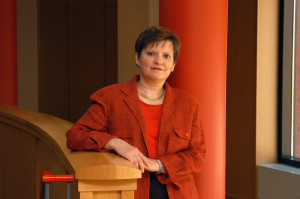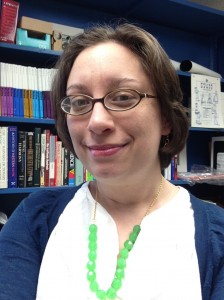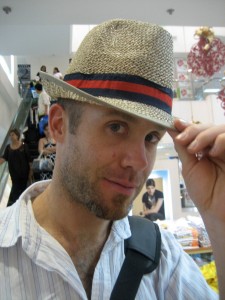Editor’s note: We invited Lawrence alumni who have gone into library work to share with us what they do and how they got there. Here’s another in a series.
When I arrived at Lawrence in the fall of 2006, I knew that I wanted to work in the campus library – it was one of my first stops during Welcome Week. From that moment on, the Mudd became an integral part of my Lawrence experience.
Attending a small liberal arts college meant that I had the chance to get to know the faculty and staff of the college on a more personal level, outside of the classroom. The library was a place where I feel I took advantage of that most, and I found role models in the reference librarians and circulation staff that I interacted with every day.
I knew I wanted to work in libraries early on, but there was one particular reference librarian (who can remain nameless to avoid embarrassment) who truly cemented the desire to be a college librarian in my mind. She truly embodies what a librarian should be, in my mind – full of a willingness to help anyone, knowledgeable about a wide range of topics (and willing to research anything she didn’t know), and an advocate for the library and its services. Other librarians and staff of the library gave their time an energy to teach me things like basic cataloging, or reserve procedures, things that all helped me on my journey towards librarianship.
Working at the Mudd gave me the direction and focus I needed going into my graduate program at Indiana University Bloomington. It was valuable for me to go to such a large school (about twenty times the size of Lawrence) to be able to compare library environments. In graduate school, I worked at three different libraries across the campus, all giving me a variety of experience in circulation and reference work.
I currently am the Liberal Arts Librarian at Bethany College in West Virginia. As glamorous as it sounds, part of the reason for the title is so that I’m not tied to any particular job within the library, which I actually love. I was hired for my experience in cataloging and working with student employees, but my role has grown to encompass our website maintenance, serials management and event planning. Occasionally I also get the opportunity to do some library instruction. I think the advantage of working at a small liberal arts college (and Bethany is particularly small – we have three full-time librarians and a part-time archivist) is that I get to do different things every day – when I’m tired of one project, I can work on another one (luckily, I also learned time management and prioritizing assignments at Lawrence).
If I have any advice for students looking into going for an MLS/MLIS degree, it’s that they should make sure they find a program with opportunities to learn and practice instruction, because that’s becoming an increasingly important part of academic librarianship. Also while in graduate school, make sure to get as much work experience as possible, because it is those jobs that will help bolster your resume. More often than not, those libraries are used to hiring graduate students and will help you mold the job into what you want or need it to be – I went from a reserves assistant to a circulation supervisor and reserves co-coordinator in one position because that library allowed me to grow the role I was hired for.
The best thing to know about libraries is that working in them is never going to be what you expect, but it will always be rewarding, if you have an open mind about whatever is going to come your way. I never would’ve anticipated living in small-town West Virginia, but after a year and half, I’m not sure there’s another job out there that would suit me quite as well!
By Beth Carpenter, Class of 2010



